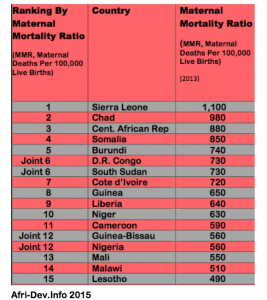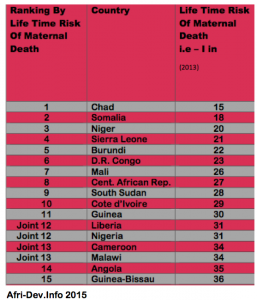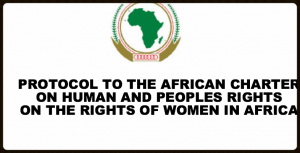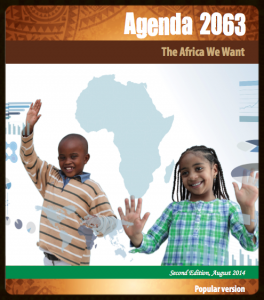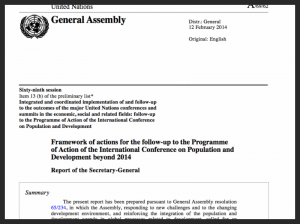


- As The MDGs Draw To An End & New Post 2015 Sustainable Development Goals (SDGs) Beckon – 38 Out Of 55 African Countries Still Have High Maternal Mortality Ratio (MMR) Of Over 300 Maternal Deaths Per 100,000 Live Births.
- 16 African Countries Have Very High Maternal Mortality Ratio (MMR) Of Over 500 Maternal Deaths Per 100,000 Live Births – Global Highest.
- Sierra Leone Has Worlds Highest Maternal Mortality Ratio (MMR) – Of 1,100 Deaths Per 100,000 Live Births.
- Followed By 15 Other African Countries With Very High MMR Of Over 500: Chad (980); Central African Republic (880); Somalia (850); Burundi (740); Democratic Republic of the Congo (730); South Sudan (730); Côte d’Ivoire (720); Guinea (650); Liberia (640); Niger (630); Cameroon (590); Guinea-Bissau (560); Nigeria (560); Mali (550); And Malawi (510).
*Lifetime Risk Of Maternal Death – Also Remains Highest In Africa
- Highest Lifetime Risk Of Maternal Death Is In Chad – 1 in 15;
- Followed By 9 Other Countries With High 1 In 18 to 1 In 30 Risk Of Maternal Death: Somalia 1 in 18; Niger 1 in 20; Sierra Leone 1 in 21; Burundi 1 in 22; DR Congo 1 in 23; Mali 1 in 26; Central African Republic 1 in 27; South Sudan 1 in 28; Cote d’Ivore 1 in 29;
Multisectoral & Social Factors: Links Between Maternal Mortality Ratio, Risk Of Maternal Death – & Underage/Child/Forced ‘Marriage’
- 13 Of The Countries With Highest Maternal Mortality Ratio – Are Also – 13 of Joint Top 15 Countries With Highest Percentages Of Underage/Child/Forced ‘Marriage’ – i.e. Where 36% – 76% Girls Under 18 Years Of Age Impregnated Through Underage/Child/Forced ‘Marriage’
- 13 Of Highest Maternal Death Risk Countries – Are Also – 13 Of Top Joint 15 Countries With Highest Percentages Of Underage/Child/Forced ‘Marriage’ – i.e. Where 36% – 76% Girls Under 18 Years Of Age Impregnated Through Underage/Child/Forced ‘Marriage’
- (In Alphabetical Order) The 13 Countries Are Cameroon, Central African Rep, Chad, D.R. Congo, Guinea, Liberia, Malawi, Mali, Niger, Nigeria, Sierra Leone,Somalia, South Sudan.
*Based on latest comparable figures from 2013
- Haemorrhage (Uncontrolled Bleeding); Sepsis (Infection); Hypertensive Disorders; Unsafe Abortion; Prolonged Or Obstructed Labour (i.e. Lack Of Access To Adequate Care; Poor Health Systems; Lack Of Skilled Personnel)
- Health & Medical Conditions Including Anaemia; Nutritional Status; Malaria; Hepatitis; Heart Disease; HIV/AIDS – All Increase Risk of Maternal Death (But Are Preventable, Treatable Or Manageable)
- Multiple Pregnancies Spaced Too Closely Together/ Absence Of Family Planning; High Adolescent Fertility & High Total Fertility Rates; Female Genital Mutilation/Cutting.
- Social Factors Such As: Inequity; Poverty; Women’s Low Status, & Negative Attitudes Towards Women’s Health & Rights; Lack Of Education & Empowerment.
- Significantly – Underlying Causes Of Maternal Mortality Includes Underage/Adolescent Pregnancies – Mostly From Underage/Child/Forced “Marriage’ – Girls Under 18 Are More At Risk Than Older Women.
- Risk Of Maternal Mortality Is Highest For Girl Children / Adolescent Girls Under 15 Years Old. Complications In Pregnancy & Childbirth Are Leading Cause Of Death Among Adolescent Girls In Developing Countries.
Top Joint 15 – Maternal Mortality Ratio & Maternal Death Risk
For context only 2 countries outside African region have high MMR: Afghanistan (400) & Haiti (380).
Impact Of Adolescent / Girl Child Pregnancy On Maternal Mortality.
(In Alphabetical Order) 13 Countries With High Maternal Mortality Ratio & Risk Of Maternal Death –
Where 36% – 76% Of Girls Under 18 Years Of Age Impregnated Through Underage/Child/Forced ‘Marriage’: Cameroon, Central African Rep, Chad, D.R. Congo, Guinea, Liberia, Malawi, Mali, Niger, Nigeria, Sierra Leone,Somalia, South Sudan.
- In high-income countries
– virtually all women have at least 4 antenatal care visits, are attended by a skilled health worker during childbirth and receive postpartum care.
- In low-income countries
– just over a third of all pregnant women have the recommended 4 antenatal care visits.
- Maternal mortality is higher
– in women living in rural areas and among poorer communities.
-
Almost all maternal deaths (99%) occur in developing countries– More than half of these deaths occur in sub-Saharan Africa and almost one third occur in South Asia.
- Developed & Developing Country MMR:
The maternal mortality ratio in developing countries in 2013 is 230 per 100,000 live births versus 16 per 100,000 live births in developed countries.
- Maternal health and newborn health are closely linked –
Almost 3 million newborn babies die every year, and an additional 2.6 million babies are stillborn.
- Some key factors preventing women from receiving or seeking care during pregnancy and childbirth are:
- Globally
– there were an estimated 289,000 maternal deaths in 2013, a decline of 45% from 1990.
- Sub-Saharan Africa region alone
– accounted for 62% (179,000) of global deaths followed by Southern Asia at 24%.
- At the country level
– the two countries accounting for one third of all global maternal deaths are India at 17% (50,000) and Nigeria at 14% (40,000).
- 6 African countries had low MMR for the period of less than 100:
Algeria (89); Mauritius (73); Cabo Verde (53); Tunisia (46); Egypt (45); and Libya (15) – i.e. maternal deaths per 100 000 live births respectively.
- The ten African countries with lowest MMR
– maternal deaths per 100 000 live births are: Botswana (170); South Africa (140); Namibia (130); Morocco (120) Algeria (89); Mauritius (73); Cabo Verde (53); Tunisia (46); Egypt (45); and Libya (15).
- By sub-regions:
North & Southern Africa have the countries with lowest MMR
- By sub-regions:
West & Central Africa have the countries with highest MMR
- The 10 countries with lowest Life Time Maternal Death Risk in Africa for the period are:
Libya 1 in 2,700; Tunisia 1 in 1,000; Mauritius 1 in 900; Cabo Verde 1 in 740; Egypt 1 in 710; Algeria 1 in 380; South Africa 1 in 300; Morocco 1 in 300; Namibia 1 in 230; and Botswana 1 in 200.
- Developed & Developing Country Life Time Risk:
The estimated lifetime risk for maternal mortality in developing regions is 1 in 3700 in comparison to developed regions where the lifetime risk is 1 in 160.
- By sub-regions: West & Central Africa have the countries with highest Maternal Death Risk
– influenced strongly by adolescent pregnancies resulting from underage/child/forced ‘marriage’
-
By sub-regions: North & Southern Africa have the countries with lowest Maternal Death Risk– taking into account that Southern Africa would have made more progress if not for HIV/AID related maternal deaths.
- Only in two African countries were 100% of births – attended by skilled personnel over 2006 – 2013 – Libya & Mauritius.
- In five other countries Botswana, Cabo Verde, Seychelles, Algeria, and Congo 90% to 99% of births were attended by skilled personnel over 2006 – 2013
- Overall over 50% of births were attended by skilled personnel in 35 African countries.
- The countries in which less than 50% of births were attended by skilled personnel are:
Angola 49%; Tanzania 49%; Zambia 47%; Guinea 45%; Kenya 44%; Madagascar 44%; Togo 44%; Guinea Bissau 43%; Central African Republic 40%; Nigeria 38%; Niger 29%; Sudan 20%; Mozambique 19%; Chad 17%; South Sudan 17%; Ethiopia 10%; Somalia 9%.
African, AU & Global Resources on Maternal Health / Maternal Death & Related Multisectoral Factors
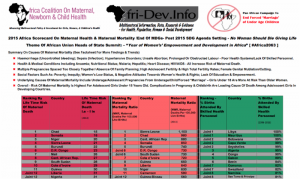 2015 Scorecard on Maternal Health – Covering Maternal Mortality Ration, Maternal Death Risk, Skilled Attendance at Birth (Afri-Dev.Info; Africa MNCH Coalition)
2015 Scorecard on Maternal Health – Covering Maternal Mortality Ration, Maternal Death Risk, Skilled Attendance at Birth (Afri-Dev.Info; Africa MNCH Coalition) 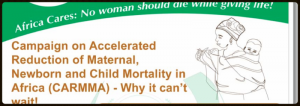 AU Campaign on Accelerated Reduction of Maternal, Newborn & Child Health (CARMMA)
AU Campaign on Accelerated Reduction of Maternal, Newborn & Child Health (CARMMA) 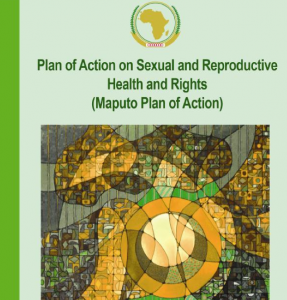 Maputo Plan of Action on Sexual & Reproductive Health * Adding It Up – The Cost & Benefits of Sexual & Reproductive Health – UNFPA & Guttmacher Institute
Maputo Plan of Action on Sexual & Reproductive Health * Adding It Up – The Cost & Benefits of Sexual & Reproductive Health – UNFPA & Guttmacher Institute 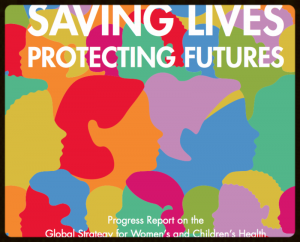 Progress Report on the Global Strategy for Progress Report on the Global Strategy for Women & Childrens Health
Progress Report on the Global Strategy for Progress Report on the Global Strategy for Women & Childrens Health 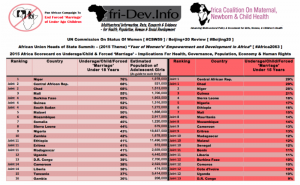 2015 Africa Scorecard On Underage/Child/Forced ‘Marriage’
2015 Africa Scorecard On Underage/Child/Forced ‘Marriage’
Related African, AU & Global Resources on Maternal & Women’s Health
- Media: For further information please contact Email: media[at]afri-dev.net
- To find out more about publications please contact email: publications[at]afri-dev.info
- For partnerships, support or general information please contact email : contactus[at]afri-dev.info

